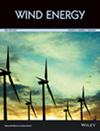Robust multi‐loop control of a floating wind turbine
IF 3.3
3区 工程技术
Q3 ENERGY & FUELS
引用次数: 0
Abstract
Abstract A principal challenge facing the control of floating offshore wind turbines (FOWTs) is the problem of instability, or “negative damping,” when using blade pitch feedback to control generator speed. This closed‐loop instability can be attributed to non‐minimum phase zeros in the transfer function from blade pitch to generator speed. Standard approaches to improving stability and performance include robust tuning of control gains and introducing multiple feedback loops to respond to platform motion. Combining these approaches is nontrivial because multiple control loops complicate the impact of coupling in the system dynamics. The single‐loop approach to analyzing stability robustness neglects inter‐loop coupling, while a simplistic multi‐loop approach is highly sensitive to dimensional scaling and overestimates the robustness of the single‐loop controller. This work proposes a sensitivity representation that separates some of the natural FOWT dynamic coupling into a parallel feedback loop in the sensitivity function loop to address both of these concerns. The modified robustness measure is used with a simplified linear FOWT model to optimize scheduled multi‐loop control parameters in an automated tuning procedure. This controller is implemented for the 10‐MW Ultraflexible Smart FLoating Offshore Wind Turbine (USFLOWT) and compared against conventional single‐ and multi‐loop controllers tuned using frequency‐domain analysis and high‐fidelity OpenFAST simulations. The multi‐loop robust controller shows the highest overall performance in generator speed regulation and tower load reduction, though consideration of power quality, actuator usage, and other structural loading leads to additional trade‐offs.浮式风力发电机的鲁棒多回路控制
浮动式海上风力涡轮机(FOWTs)控制面临的主要挑战是不稳定问题,或“负阻尼”,当使用桨距反馈来控制发电机转速时。这种闭环不稳定性可归因于从桨距到发电机转速的传递函数中的非最小相位零。提高稳定性和性能的标准方法包括鲁棒调节控制增益和引入多个反馈回路来响应平台运动。结合这些方法是非常重要的,因为多个控制回路使系统动力学中的耦合影响复杂化。分析稳定性鲁棒性的单环方法忽略了环间耦合,而简单的多环方法对维尺度高度敏感,并且高估了单环控制器的鲁棒性。这项工作提出了一种灵敏度表示,它将一些自然的FOWT动态耦合分离到灵敏度函数回路中的并行反馈回路中,以解决这两个问题。改进的鲁棒性度量与简化的线性FOWT模型一起用于自动调谐过程中调度的多环控制参数的优化。该控制器用于10兆瓦超柔性智能浮式海上风力涡轮机(USFLOWT),并与使用频域分析和高保真OpenFAST模拟调谐的传统单回路和多回路控制器进行了比较。多回路鲁棒控制器在发电机调速和塔负荷降低方面表现出最高的整体性能,但考虑到电力质量、执行器使用和其他结构负载会导致额外的权衡。
本文章由计算机程序翻译,如有差异,请以英文原文为准。
求助全文
约1分钟内获得全文
求助全文
来源期刊

Wind Energy
工程技术-工程:机械
CiteScore
9.60
自引率
7.30%
发文量
0
审稿时长
6 months
期刊介绍:
Wind Energy offers a major forum for the reporting of advances in this rapidly developing technology with the goal of realising the world-wide potential to harness clean energy from land-based and offshore wind. The journal aims to reach all those with an interest in this field from academic research, industrial development through to applications, including individual wind turbines and components, wind farms and integration of wind power plants. Contributions across the spectrum of scientific and engineering disciplines concerned with the advancement of wind power capture, conversion, integration and utilisation technologies are essential features of the journal.
 求助内容:
求助内容: 应助结果提醒方式:
应助结果提醒方式:


